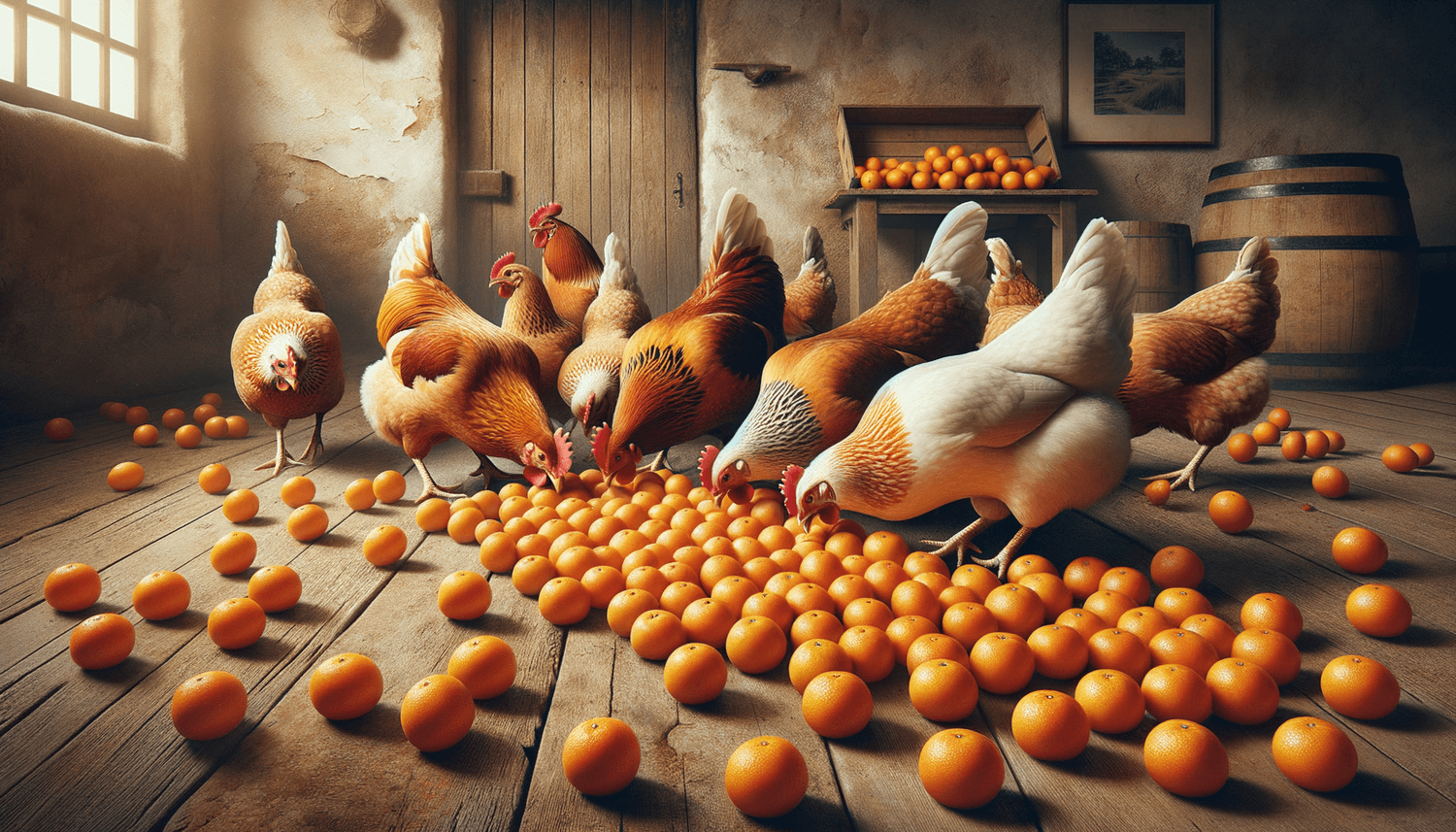Pecking about to see if chickens can feast on satsumas? You’ve come to the right place! Your feathery friends always seem to be on the lookout for new and delightful treats, and satsumas might just be the next juicy sensation! In this fun, informative blog post, we’ll cluck over whether your backyard chickens can enjoy these zesty fruits, explore the importance of a balanced diet, and discuss the nutritional value, benefits and risks of giving them these citrus delights. So get ready to put on your best chicken-whisperer hat as we learn how to prepare these tasty morsels for your clucky companions!
Can chickens eat satsumas?
Yes, chickens can eat satsumas, and it is safe for them to do so in moderation. Satsumas are packed with vitamins and nutrients beneficial for your feathered friends. However, it’s essential not to overindulge them with citrus fruits, as too much citrus can lead to a decrease in egg production and an upset digestive system.
A balanced diet for chickens
Just like humans, chickens need a balanced diet to maintain their health, growth, and egg production. Providing your flock with the right nutrition is essential for their wellbeing. A chicken’s diet should primarily consist of high-quality chicken feed, which should make up around 80-90% of their diet. Chicken feed is formulated to meet all their nutritional requirements, including protein, vitamins, and minerals that they need to thrive.
The remaining 10-20% of their diet can consist of treats, like fruits and vegetables. These not only help to provide a healthy variety to their diet but also encourage natural foraging behaviors. Remember to introduce new treats in moderation, and always ensure they are safe for your chickens to consume. It’s important to avoid upsetting a chicken’s gut health or negatively impacting their egg production with an unbalanced diet.
Nutritional value of satsumas for chickens.
Feeding satsumas to your chickens does indeed offer nutritional value. These citrus fruits provide an array of vitamins and minerals that can benefit your flock’s health. One of the key nutrients in satsumas is vitamin C, which helps in strengthening the immune system, supporting tissue repair, and maintaining good overall health. Although chickens can produce their own vitamin C, providing extra through their diet can still be helpful.
Besides vitamin C, satsumas also contain vitamins A and B, which play roles in vision, growth, skin health, immune function, and energy production. Satsumas also have essential minerals like potassium, calcium, and phosphorus, which contribute to bone health, eggshell formation, and maintaining overall body functions. Additionally, including fruits like satsumas can provide dietary diversification and help promote natural foraging behavior in chickens.
Hydration is another significant aspect of a chicken’s overall health, and including water-rich treats in their diet can be beneficial, especially during hot summer months. Satsumas are composed of around 86-87% water, which means that they can help in keeping your chickens hydrated. However, this should not replace the need for providing clean, freshwater to your flock at all times.
Nutrition table of satsumas for chickens.
| Information | Description |
|---|---|
| Nutritional Value | Rich in vitamins A, B, and C, as well as minerals like potassium, calcium, and phosphorus |
| Suggested Serving Size | 1-2 small satsuma segments per bird, given as an occasional treat, not a staple |
| Safe Feeding Practices | Introduce satsumas in moderation within the 10-20% treats portion of their diet |
| Preparation | Peel and remove seeds from satsumas before giving them to your chickens |
| Potential Risks | Excessive citrus consumption can lead to decreased egg production and upset digestive system |
| Hydration | Satsumas are 86-87% water, helping to keep chickens hydrated during hot weather |
| Digestion | Citrus fruits in small quantities can aid digestion but too much may cause digestive issues |
| Seasonal Availability | Available during the winter months, making it a healthy treat during this season |
| Other Benefits | Promotes natural foraging behavior and provides dietary diversification |
Preparing satsumas for your chickens
When you offer these tasty treats to your chickens, ensure you prepare the satsumas properly. Peel the fruit and remove any seeds before feeding them to your flock. Seeds can be a choking hazard or may cause digestive problems. Satsuma segments can be left whole or chopped into smaller pieces depending on the size and preference of your chickens.
Alternative citrus treats
If your chickens enjoy satsumas, there are other citrus fruits you may want to consider adding to their diet. Keep in mind that citrus should be given in limited quantities, so rotating different fruits can be a good strategy. Mandarin oranges, tangerines, and clementines are all wonderful citrus options that provide similar benefits due to their nutritive content.
Know the treats to avoid
While satsumas and other citrus fruits can be a part of your chicken’s treat rotation, there are certain foods you must avoid giving to your flock to keep them safe and healthy. For example, never feed your chickens chocolate, caffeine, alcohol, or foods high in sugar, salt, or fat. Additionally, avoid feeding them rotten, moldy, or spoiled food, as these can cause serious health issues.
A happy, healthy flock
In summary, chickens can safely enjoy satsumas as an occasional treat, bringing valuable nutrients and variety to their diet. By providing your flock with a balanced diet, fresh water, and monitoring any changes in their egg production or overall health, you’ll ensure a thriving, happy flock that rewards you with delicious, nutritious eggs.

















